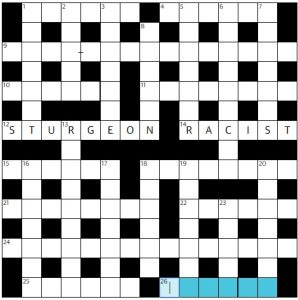Maybe it was a mistake, but The Guardian's crossword just looked like anti-SNP propaganda
On Wednesday 1 March, readers of The Guardian got a surprise when they completed the paper's cryptic crossword. As two answers appeared to be anti-SNP propaganda.
Warning: this article contains crossword spoilers.
Wait, what...?
The answers to 12 and 14 across in the paper's crossword spelled out this:

The Guardian has been caught up in a row over London Mayor Sadiq Khan's comments about Scottish independence supporters. Khan had planned to say in a speech that there "was no difference" between people who wanted an independent Scotland and racism or bigotry. Because all were intent on dividing society.
The SNP leader and First Minister Nicola Sturgeon hit back at Khan:
https://twitter.com/NicolaSturgeon/status/835417036884951041
But Claire Heuchan, a Guardian columnist, wrote an article supporting Khan. She said of 2014's independence referendum:
The relentlessness of nationalists’ need to distance Scotland from the rest of the UK on the grounds that we were not like them filled me with anything but hope. The message of difference, that it must lead to separation, forced me to question how people of colour and migrants fitted into their idea of Scottish society at a time when purism governed understanding of Scottish identity and belonging.
Heuchan claimed that abuse from Scottish independence supporters about her column forced her to leave Twitter. She claimed that people were trying to “find out” where she lived:
When I saw people were trying to work out my location, [I] became physically terrified. I started shaking and crying. I don’t feel safe.
Is there a problem?
The row over Khan’s comments caused controversy among Scottish independence supporters. Many of whom pointed out they were from minority communities themselves:
https://twitter.com/RobertJSomynne/status/835387300058181632
The Guardian published an article by Somynne, in which he stated:
Claire Heuchan, who received an intolerable amount of abuse for airing her views about the links between Scottish nationalism and racism, is correct that a nationalist feature is to define against as much as for an ideal or people. I disagreed profoundly with the article that she wrote, yet it is crucial that opposing views are engaged with in a calm and constructive manner. I cannot dismiss her ideas or experience, as I hope mine will not be. However, a critique of Scottish nationalism as simply being an oppositional defining force misses the context of that defining.
With Theresa May’s Brexit negotiations continuing to be as chaotic as ever, the debate over a second independence referendum in Scotland continues to rage. And, whether intentional or not, The Guardian’s support for Khan, and its ‘cryptic’ crossword, will have done the paper few favours among those who support ‘Yes’.



